

MOOCS. No such thing as a free MOOC. In his recent Jisc blog, David Kernohan asks: ‘Why bother paying inflated fees to attend university?
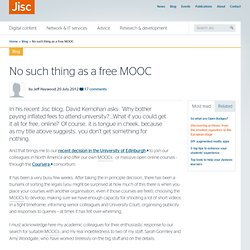
Post-MoocMooc Wiki. Sherman Dorn: Work to understand how schools have been social institutions. Common Core: Okay is better than 90% crud By Sherman Dorn on April 8, 2014 Gene Glass and David Berliner are starting in on a sequel to their 50 Myths book that came out recently.
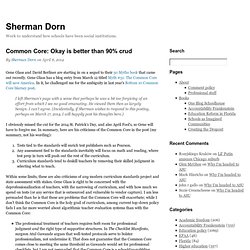
Gene Glass has a blog entry from March 12 titled Myth #51: The Common Core will save America. Developing personal learning networks for open and social learning. In 2008, an open access, graduate level, educational technology course was offered at the Faculty of Education, University of Regina.
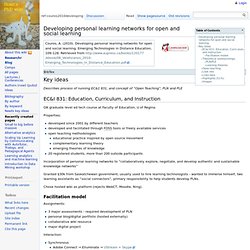
Hybridity, pt. 3: What Does Hybrid Pedagogy Do? This is the third in a series of articles that investigates hybridity as it relates to our positions as teachers and scholars, but also as learners, composers, and community members.
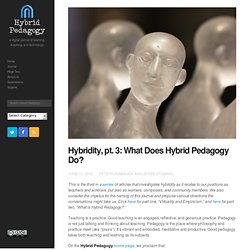
We also consider the impetus for the naming of this journal and propose various directions the conversations might take us. Click here for part one, “Virtuality and Empiricism,” and here for part two, “What is Hybrid Pedagogy?” Teaching is a practice. Good teaching is an engaged, reflective, and generous practice. Pedagogy is not just talking and thinking about teaching. How to MOOCify your course and why you should do it: Reasons, skills and tools #moocmooc. This post is part of the MOOC MOOC course of work.
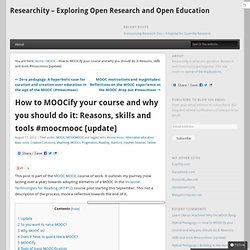
It outlines my journey (now lasting over a year) towards adopting elements of a MOOC in the Inclusive Technologies for Reading (#ITR12) course pilot starting this September. This not a description of the process, more a reflection towards the end of it. Update I was inspired by the comment by Vivian Halloran below sharing her ideas about how she’s MOOCifying her course to create a repository of MOOCified courses. This could help all MOOCifiers to see how others are making their courses MOOC-like. MoocMooc – Looking Back « Toasting Snowflakes. I’m taking part in MoocMooc, a mooc about moocs.
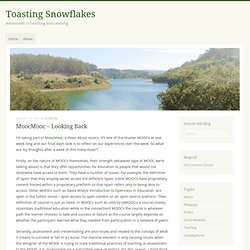
I-d5ntLrTtLnuHfl8f2Iw5K0PXa6gxORncxxyVy4NR. Behind the scenes of Godzilla movies, 1954-1965. Godzilla, 1954 Godzilla Raids Again, 1955.

How To Crowdsource Grading. MOOCs and “Prior Learning Assessment” More in the series of “the summer of MOOCs” articles and posts here: Inside Higher Ed has an interesting article, “Making It Count.”
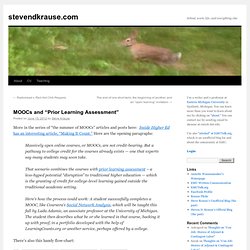
Here are the opening paragraphs: Massively open online courses, or MOOCs, are not credit-bearing. But a pathway to college credit for the courses already exists — one that experts say many students may soon take.That scenario combines the courses with prior learning assessment – a less-hyped potential “disruption” to traditional higher education — which is the granting of credit for college-level learning gained outside the traditional academic setting.Here’s how the process could work: A student successfully completes a MOOC, like Coursera’s Social Network Analysis, which will be taught this fall by Lada Adamic, an associate professor at the University of Michigan. Despite rumors, creditialing still an impasse for universities offering MOOCs. The University of Washington plans to offer “enhanced” versions of the massive open online courses (MOOCs) it will develop through a partnership with Coursera, according to the university’s provost.
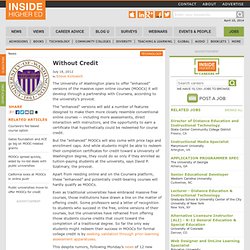
The "enhanced" versions will add a number of features designed to make them more closely resemble conventional online courses -- including more assessments, direct interaction with instructors, and the opportunity to earn a certificate that hypothetically could be redeemed for course credit. But the “enhanced” MOOCs will also come with price tags and enrollment caps. And while students might be able to redeem their completion certificates for credit toward a University of Washington degree, they could do so only if they enrolled as tuition-paying students at the university, says David P.
Rhizomatic Learning and MOOCs – Assessment. I received a question on twitter today about one of my favourite fist slamming on the table topics, assessment, and figured i would use the opportunity to put down a few thoughts about rhizomatic learning and how it impacts the way I see MOOCs.
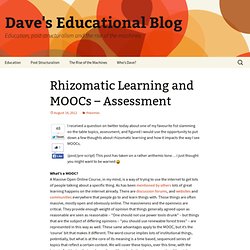
(post/pre-script) This post has taken on a rather anthemic tone… i just thought you might want to be warned What’s a MOOC? Commentary on Comments « Connection not Content. Commenting in MOOCS As I experiment with my comment scraping program I’m becoming more aware of the important role that MOOC participants play in commenting on each others blogs. A Letter from a Hybrid Student. The rise of stuff like hybrid pedagogy, open source content, and massive open online courses (MOOCs) is changing the relationships between teachers, students, and the technologies they share. Pedagogy is no longer solely the domain of instructors; we must open the dialogue to students. This article starts a new strand on Hybrid Pedagogy in which we begin to disrupt the student / teacher binary by bringing students more fully into the conversation about their own learning.
I’m not sure how to talk to teachers about teaching. Following the herd, or joining the merry MOOCscapades of higher-ed bloggers. Following the herd, or joining the merry MOOCscapades of higher-ed bloggers Posted on July 31, 2012 by Melonie Fullick For those who follow the higher education news, the week of July 16th to 22nd will stand out as one in which the term “MOOC” (Massive Open Online Courses, for the uninitiated) hit a high point as the “higher-ed buzzword of the year”. MOOCs Fail Students With Dark Age Methods.
The sudden rise of the Massive Open Online Course (MOOC) has been a shock for many in the education industry - no more so than to programmers engaged in creating educational software. The shock is that the methods used by these hugely successful courses are little changed from the dark ages. If you think I'm being a critical outsider, then you might like to know that one of the leading lights in the movement, Peter Norvig, agrees with me. He even makes a joke in his recent Ted Talk that lectures in MOOCs are just like the 16th century monastic lecture theaters complete with the guy at the back sleeping! The trouble is that unless you realize how things could be, you just don't see the lack of progress in the current crop of courses.
I was talking with a colleague who used to create educational software about MOOCs and phenomena like Khan Academy and we agreed very quickly:- The MOOC Guide. Broadcast Education: a Response to Coursera. Coursera is silly. Good MOOC's, Bad MOOC's - Brainstorm. So I just finished a brief radio appearance (CBC) on the subject of Massive Open, Online Courses (MOOCs). The main guest was George Siemens who, with Stephen Downes, helped pioneer these courses in Canada.
Even though all of the press coverage has gone to the competing Stanford edu-preneurs behind Coursera and Udacity, Siemens and Downes have done much of the most important work, theoretical and practical, distinguishing between good and bad MOOC’s. #MOOCMOOC Connectivism – Putting theory into practice. Here is an interesting presentation on Connectivism – its practice in Coursera.
Why Online Education Won't Replace College - Commentary. MOOCs Inc. I thought I’d write a couple of posts around MOOCs, and in particular, the sudden awakening of senior management, media and companies to them. I-llbdeabywzIPESvmWxCBsumxHd1YpelchjnzHZVr. Loveless MOOCs. 78 Flares Twitter 21 Facebook 47 Google+ 5 LinkedIn 5 inShare5 78 Flares × Teaching & Learning Is there a paradigm shift to learning in higher education or are universities going to continue focusing on content delivery and expect teachers to instruct and teach? MOOC MOOC Participants.